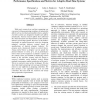Free Online Productivity Tools
i2Speak
i2Symbol
i2OCR
iTex2Img
iWeb2Print
iWeb2Shot
i2Type
iPdf2Split
iPdf2Merge
i2Bopomofo
i2Arabic
i2Style
i2Image
i2PDF
iLatex2Rtf
Sci2ools
170
click to vote
RTSS
2000
IEEE
2000
IEEE
Performance Specifications and Metrics for Adaptive Real-Time Systems
While early research on real-time computing was concerned with guaranteeing avoidance of undesirable effects such as overload and deadline misses, adaptive real-time systems are designed to handle such effects dynamically. Various research efforts have addressed the characterization and improvement of the dynamic behavior of real-time systems. However, to the authors' knowledge, no unified framework exists for designing adaptive, real-time software systems based on specifications of desired dynamic behavior. We propose such a framework based on control theory. Using control theory a designer can (i) specify the desired behavior in terms of a set of performance metrics that can be mapped to a dynamic response of the control system, (ii) establish an underlying control model of the real-time systems, and (iii) design a resource scheduler using feedback control design methods to guarantee runtime satisfaction of the specs. This is in contrast to more ad hoc techniques. We also show ...
Related Content
| Added | 01 Aug 2010 |
| Updated | 01 Aug 2010 |
| Type | Conference |
| Year | 2000 |
| Where | RTSS |
| Authors | Chenyang Lu, John A. Stankovic, Tarek F. Abdelzaher, Gang Tao, Sang Hyuk Son, Michael Marley |
Comments (0)

